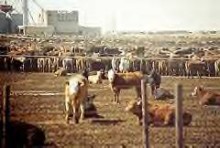
 If you’re a meat-eater, nothing quite satisfies like a tender, juicy steak or a glistening slab of prime rib. It’s full of protein, B vitamins, and selenium, and serves as a staple of the American diet. Now if you’re smart about health, you’ll know to limit your servings to 1-2 a week, to avoid high cholesterol and fat intake, but there’s one more thing you need to be careful of, whether you’re consuming meat or dairy products-growth hormones.
If you’re a meat-eater, nothing quite satisfies like a tender, juicy steak or a glistening slab of prime rib. It’s full of protein, B vitamins, and selenium, and serves as a staple of the American diet. Now if you’re smart about health, you’ll know to limit your servings to 1-2 a week, to avoid high cholesterol and fat intake, but there’s one more thing you need to be careful of, whether you’re consuming meat or dairy products-growth hormones.
According to Science News, about 2/3 of American cattle raised for slaughter are injected with hormones to make them grow faster, while dairy cows are given a genetically engineered hormone called rBGH to increase milk production. The USDA and FDA claim these hormones are safe, but the European Union (EU) begs to differ.
They’ve banned the use of six growth hormones and have prohibited the import of hormone-treated beef since 1988. In 2002, an EU scientific panel reviewed a series of 17 studies on the six banned hormones and concluded that eating beef from cattle raised on growth hormones is a potential health risk.
As we’ve mentioned in previous posts, exposure to any sort of hormone can be dangerous, as they can interfere with our own natural hormones, potentially causing developmental problems and altering DNA. IGF-1, a growth factor and intermediary by which rBGH acts, has been linked to colon cancer by the Consumers Union. “It is the same as human IGF-1, and there are elevated levels of it in cows and milk,” says Jean Halloren of the Consumers Union. “It could affect the tissues it touches in the colon, to cause colon cancer.” Samuel E. Epstein of the University of Illinois has warned about possible breast cancer from the increased IGF-1 levels, showing that IGF-1 increases the growth of breast cells in the lab.
The list of health-related problems stemming from hormones doesn’t end there. Researchers from Tufts University assert they may cause girls to reach puberty earlier than usual, making them more susceptible to breast cancer. In 2003, CBS News reported on research conducted at the Ohio State University, where scientists mixed beef from hormone-treated cows with human breast cancer cells and saw significant cancer-cell growth. Andrea Martin, founder of the Breast Cancer Fund, commented, “It’s really a matter of women waking up and demanding to know what is in their products and in their food.”
We haven’t even hit on the environmental effects yet. Growth hormones remain in the meat we eat and in the manure left behind by the cows, where they can contaminate water supplies and fertilizers used to grow fruits and vegetables. Lou Guillette, a biologist at the University of Florida, examined the effects of hormones from cattle feedlots that had contaminated surrounding waters, and found serious damage to the reproductive systems of fish downstream.
What about the cows themselves? Dairy farmers have reported increasing cases of severe mastitis after beginning rBGH injections. Other farmers had similar problems with their stock, along with hoof diseases, open sores, and internal bleeding. According to Barney Harris Jr., retired professor, Dairy Science Department, University of Florida, cows forced to produce unnaturally high quantities of milk often suffer malnourishment.
What can you do to protect yourself, your family, and the environment? The Environmental Working Group (EWG) suggests you buy organic dairy and meat products that carry the certified organic seal, as these products are not allowed to use growth hormones. Some good brands: Organic Valley and Stonyfield Farm. You can also check out the Eat Well Guide for a listing of sources for hormone-free beef and dairy products. Sustainable Table also offers a rBGH-free dairy list to help you find hormone-free brands in your state.
Do you have any favorite hormone-free brands of beef and dairy? Please let us know.
Photo courtesy Socially Responsible Agricultural Project via Flickr.com.

